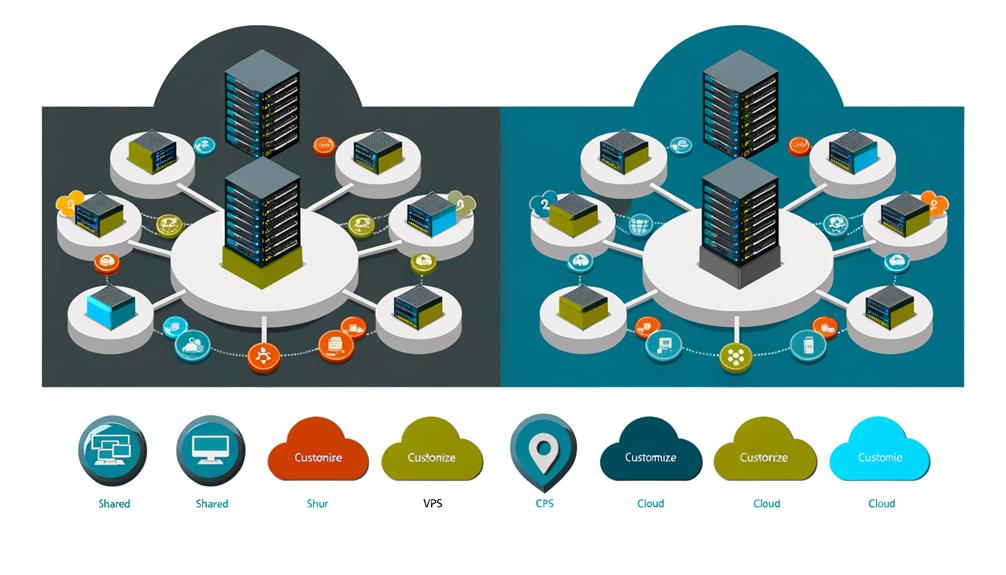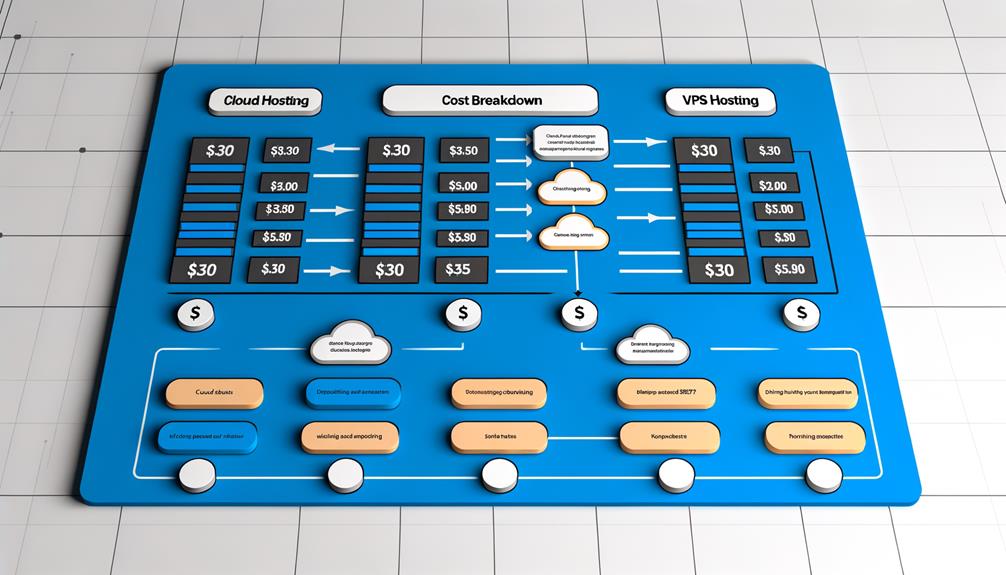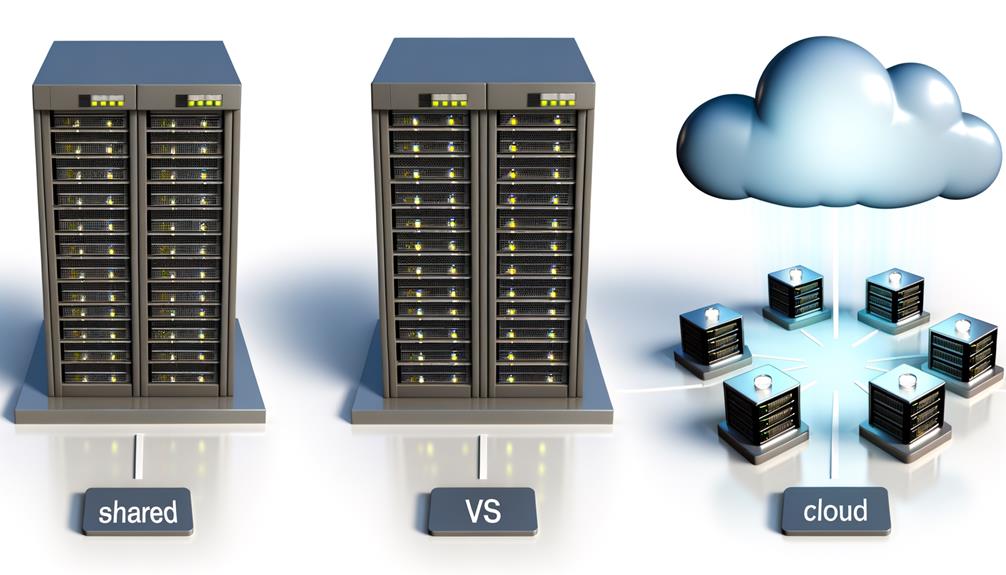As we embark on a journey to explore the intricacies of web hosting, we are faced with the pivotal decision of selecting the most suitable option for our online presence.
The landscape of shared hosting, VPS, and cloud hosting offers a myriad of possibilities, each with its own set of advantages and considerations.
The choice we make will not only impact the performance and security of our website but also play a significant role in shaping our digital footprint.
So, which hosting solution should we opt for to ensure optimal results?
Join us as we unravel the complexities of shared hosting, VPS, and cloud hosting to empower you with the knowledge needed to make an informed decision for your online platform.
Shared Hosting Overview

When considering web hosting options, shared hosting provides an affordable and convenient way to launch a website with minimal technical requirements. It's a common method of hosting that allows multiple users to share physical server resources.
While it's cost-effective, there are potential drawbacks such as slow loading times, difficult access, and security risks. However, for those seeking liberation from complex technical setups and high costs, shared hosting offers an accessible entry point into the online world.
It's ideal for small businesses, personal websites, and startups looking to establish their online presence without breaking the bank. With shared hosting, users can get their websites up and running quickly, allowing them to focus on their content and audience engagement rather than getting bogged down in technical intricacies.
Pros and Cons of Shared Hosting
Moving from the overview of shared hosting, we now turn our attention to the pros and cons of this widely used hosting method.
Shared hosting offers an affordable entry point for website hosting, making it an attractive option for those with budget constraints. Additionally, it requires minimal technical knowledge, providing ease of use for beginners.
However, the main drawback is the shared resources, which can lead to slower loading times and potential security vulnerabilities. Limited customization and scalability also restrict the growth of high-traffic websites.
Despite these drawbacks, shared hosting remains a popular choice due to its cost-effectiveness. It's essential to carefully weigh the benefits and limitations to determine if shared hosting aligns with your website's needs and your aspirations for liberation.
VPS Hosting Overview

VPS hosting revolutionizes the traditional hosting experience by offering users greater control and flexibility within a virtualized environment. With VPS, users share physical server space but have separate partitions in a virtual layer, enabling the installation of custom operating systems and software.
This hosting solution is ideal for consumer-focused websites, providing faster loading times and improved security. While VPS requires more technical knowledge to manage the server and improper configuration can pose security vulnerabilities, its benefits in terms of performance and control are clear.
Compared to shared hosting, VPS delivers better performance and increased bandwidth, albeit at a higher cost. For those seeking liberation and enhanced capabilities in their hosting, VPS stands as a compelling choice.
Pros and Cons of VPS Hosting
In weighing the advantages and drawbacks of VPS hosting, it becomes evident that this hosting solution offers a tailored approach for those seeking enhanced control and performance.
VPS hosting provides a higher level of control and customization compared to shared hosting, allowing users to install their own operating systems and software. This enhanced control leads to improved performance, faster loading times, and better bandwidth allocation.
However, it's important to note that managing a VPS requires a certain level of technical expertise, which may be a drawback for some users. Additionally, improperly configured VPS servers can pose security vulnerabilities, requiring careful attention to configuration and security measures.
Despite these considerations, VPS hosting remains a compelling option for those seeking a balance of control, performance, and security.
Cloud Hosting Overview

Cloud hosting revolutionizes the traditional web hosting model by harnessing the power of virtual servers in a dynamic and scalable environment.
- Cloud server runs in a cloud computing environment
- Website owners have stability and security as software is isolated
- Cloud hosting offers reliability, scalability, and distributed nature
- Allows for adding memory and processing power as needed
This innovative approach provides liberation from the constraints of physical servers, offering unparalleled flexibility and efficiency.
With cloud hosting, we can break free from traditional limitations and embrace a solution that adapts to our needs, providing the freedom to scale resources and ensure optimal performance.
Pros and Cons of Cloud Hosting
Cloud hosting presents an unparalleled opportunity for website owners to leverage a dynamic and scalable infrastructure, empowering them with the freedom to adapt to evolving demands and ensure optimal performance.
The pros of cloud hosting include its reliability, as the website data is spread across multiple servers, reducing the risk of downtime. Additionally, the scalability of cloud hosting allows for seamless resource expansion to meet growing needs.
However, it's essential to consider the potential cons, such as cost, as cloud hosting can be more expensive than other options, especially if not carefully managed. Furthermore, the complexity of managing a cloud hosting environment may require a certain level of technical expertise.
Despite these considerations, the inherent flexibility and robustness of cloud hosting make it a compelling choice for those seeking liberation from traditional hosting constraints.
Shared Hosting Vs. VPS Hosting

Considering the robustness and scalability of cloud hosting, it's evident that the pivot towards discussing the comparison between shared hosting and VPS hosting is essential in understanding the nuanced differences and benefits of each option.
- Shared Hosting:
- Multiple users sharing physical server resources
- Cost-effective but potential for limited resources and security drawbacks
- Common method of hosting
- VPS Hosting:
- Greater privacy and control through logical partitioning
- Better performance with decreased loading times and improved bandwidth
- Requires more technical knowledge to manage the server
When considering liberation in your hosting choice, it's important to weigh the trade-offs. Shared hosting offers affordability but with potential drawbacks, while VPS hosting provides greater control and performance with added technical requirements. Choose wisely to align with your website's needs.
Cloud Hosting Vs. Shared Hosting
When weighing the hosting options for a website, it's essential to carefully consider the differences between cloud hosting and shared hosting to make an informed decision that aligns with the specific requirements and goals of the website.
Cloud hosting provides on-demand, scalable resources in a cloud computing environment, offering stability, security, reliability, and scalability. It runs in a cloud computing environment, isolating the software for website owners.
In contrast, shared hosting relies on a single physical server shared by multiple users, potentially leading to slower loading times and security concerns.
Cloud hosting is significantly faster than shared hosting due to the use of virtual servers and offers enhanced security with the right controls. Although shared hosting is cheaper, it may not provide the same level of performance and security as cloud hosting.
Cost Comparison: Cloud Vs. VPS

While evaluating the hosting options for a website, it's crucial to carefully consider the cost comparison between cloud hosting and VPS to make an informed decision that aligns with the specific requirements and goals of the website.
- Cloud Hosting:
- Offers scalability and accessibility
- Prioritizes on-demand, scalable resources in the cloud
- Provides faster loading times due to virtual servers
- VPS Hosting:
- Prioritizes control and security
- Delivers better performance with decreased loading times and improved bandwidth
- Requires more technical knowledge to manage the server
Careful consideration of the cost and benefits of each option is necessary to ensure that the chosen hosting solution meets the website's needs and budgetary constraints effectively.
Choosing the Right Hosting Option
To choose the right hosting option, carefully evaluate your website's specific requirements and budget to determine the most suitable solution for your needs. Consider the level of control, technical knowledge, and security you require.
Shared hosting is cost-effective, but it may have limited resources and security.
VPS hosting provides more control and resources, but it requires technical knowledge to manage the server.
Cloud hosting offers scalability and accessibility, but it can be more expensive.
It's crucial to prioritize your website's performance, security, and scalability. Each hosting option has its own benefits and drawbacks, so it's essential to weigh them against your website's specific needs.
Frequently Asked Questions
How Does the Physical Location of the Hosting Server Affect the Performance of the Website?
The physical location of the hosting server directly impacts website performance. It influences factors like loading speed, latency, and access times.
A server located closer to the target audience can result in faster page loading and improved user experience. Conversely, a server located far away may lead to slower loading times and decreased performance.
Therefore, considering the geographical location of the hosting server is crucial for optimizing website performance.
Can I Switch From Shared Hosting to VPS or Cloud Hosting Without Experiencing Downtime for My Website?
Yes, we can switch from shared hosting to VPS or cloud hosting without experiencing downtime for our website.
By planning the migration carefully and coordinating with the hosting provider, we can seamlessly transition our website to a new hosting environment.
It's essential to ensure that all necessary configurations and settings are in place before initiating the switch to minimize any potential disruptions to our website's availability.
What Are the Potential Environmental Impacts of Each Type of Hosting?
We should consider the potential environmental impacts of each hosting type. Our choices can affect energy consumption, carbon emissions, and resource usage.
Shared hosting, VPS, and cloud hosting all have different environmental footprints. It's crucial to assess the energy efficiency and sustainable practices of hosting providers.
What Level of Customer Support Is Typically Offered With Each Type of Hosting?
When it comes to customer support, it's crucial to consider the level of assistance offered with each hosting type. Whether it's shared, VPS, or cloud hosting, we prioritize reliable and responsive customer support.
Our team is committed to providing comprehensive assistance, addressing technical issues, and ensuring a smooth hosting experience. We understand the importance of robust customer support and strive to deliver exceptional service across all hosting platforms.
How Do Different Hosting Options Affect Search Engine Optimization (Seo) for My Website?
Different hosting options impact SEO differently. Our goal is to optimize website performance and security.
Shared hosting may lead to slower loading times, affecting SEO rankings.
VPS provides better loading times and improved security, positively impacting SEO.
Cloud hosting's scalability and reliability can boost SEO.
Considering SEO needs, VPS and cloud hosting offer advantages over shared hosting.
It's crucial to weigh these factors when choosing the best hosting for SEO impact.
Conclusion
In conclusion, the choice between shared hosting, VPS, and cloud hosting ultimately depends on your specific website needs and budget.
Shared hosting is affordable but lacks control.
VPS offers more control but at a higher cost.
Cloud hosting provides scalability and reliability at a premium price.
By understanding the key distinctions and weighing the pros and cons of each option, you can make an informed decision to ensure the optimal performance and security of your website.







